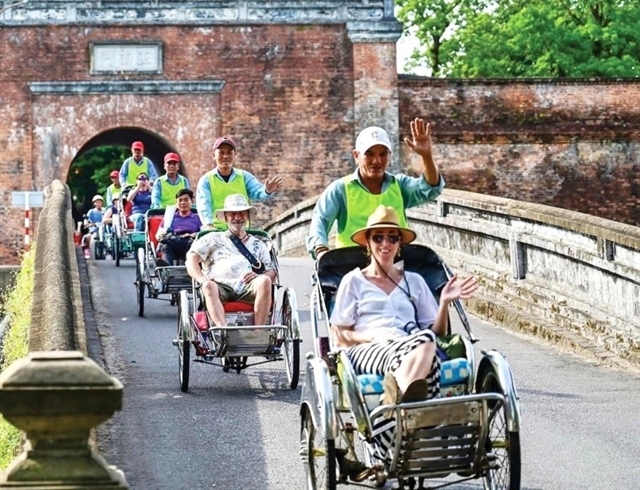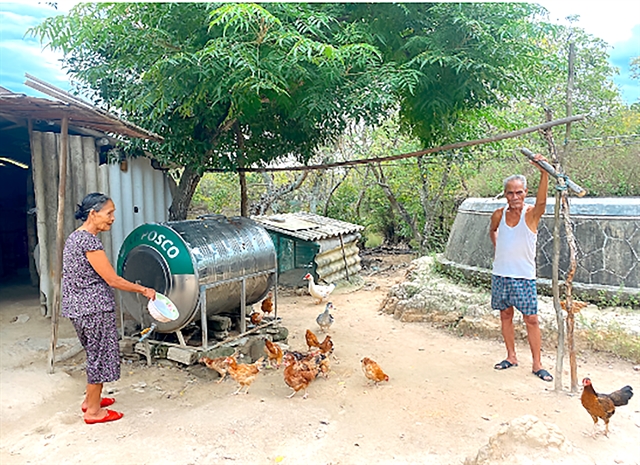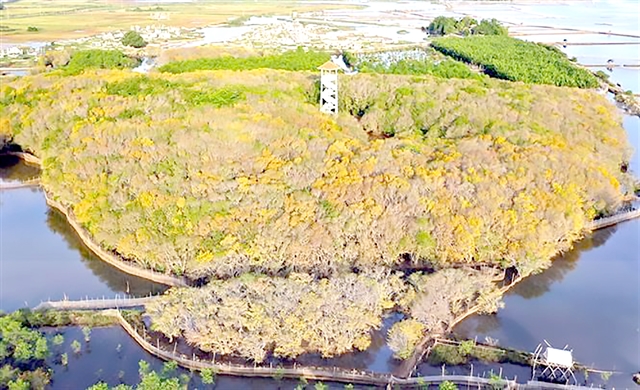 Society
Society

 |
| Nguyễn Ngọc Đáp, 78, and his wife Trần Thị Hồng, 76, have been living in Rú Chá Forest in the central province of Thừa Thiên Huế for nearly 40 years. Photo toquoc.vn |
THỪA THIÊN HUẾ Nguyễn Ngọc Đáp, 78, and Trần Thị Hồng, 76, have been living in Rú Chá Forest in the central province of Thừa Thiên Huế for about 40 years.
The couple spend their time protecting the forest, reported the Tài nguyên và Môi trường (Natural Resources and Environment) managzine.
Around 12km from the ancient capital city of Huế, Rú Chá Mangrove Forest is nestled in Tam Giang Lagoon. In the local dialect, rú means forest while chá is the name of the trees that grow in the forest.
With an area of about five hectares, this is one of the rare primeval mangrove forests left in the lagoon system. Its main functions include preventing salinity and protecting aquatic resources.
 |
| When Autumn sets in, the forest is covered with a brilliant yellow colour, creating a peaceful setting. VNA/VNS Photo |
In autumn, the trees turn yellow, revealing an untouched natural beauty which enchants visitors. In the heart of the forest is an observatory allowing visitors to admire the panoramic view of the surrounding green spaces and Tam Giang Lagoon.
In around 1990, Đáp suggested he and his wife “live in Rú Chá Forest”.
At that time, the forest was wild and deserted with no one willing to live there. Hồng disagreed because she thought "it is difficult to live normally, let alone in the isolated forest. How would we eat?".
Hồng said that she was worried about life in the forest, but her husband tried to convince her that "birds in the sky, fish and shrimp in the water, why are you afraid of starving to death. Only if you don't work, you will be powerless."
Hồng was gradually persuaded and agreed to follow him into the forest.
He chose a fairly high mudflat in the middle of the forest and built a simple house.
In the house, the elderly couple lived without electricity and fresh water for years, completely separate from the village.
Đáp asked the local authority to allocate him a plot of land next to the forest so that he could raise shrimp and fish. Meanwhile his wife borrowed money to buy chickens and ducks.
In the evening, with no electricity, the couple lights an oil lamp. Everyday, with no fresh water to drink, they collect rain water for cooking and daily life.
For nearly 40 years living in the mangrove forest, the old couple's life is still difficult, but for them, where there is land and water, there will be a source of life.
For years, Đáp still roams the forest every day to check if there is anything unusual, then report it to the local authority.
Hồng stays at home to take care of the chickens and ducks. Sometimes, she welcomes guests to visit the forest, which brings her some extra income.
Forest rangers
When Đáp and his wife started living in Rú Chá, there were few trees. People in Thuận Hóa Village usually came to catch shrimp, fish, or crabs.
However, some people tried to cut down the trees to make firewood.
Witnessing that the forest was severely damaged by humans, Đáp told villagers not to cut down the trees.
“The forest that nature gives this land is a 'natural wall' that can shield the area from erosion and keep the waves and winds from Thuận Hóa village,” Đáp said.
With the determination to protect the forest, every night with an oil lamp in his hand, he would patrol to check if anyone had sneaked into the forest to cut trees. If they had, he would raise the alarm and try to stop them.
If he came across someone looking to cut down trees, he would explain the benefits that the forest brings to human life, Đáp said.
When asked if he was afraid that people would get violent, Đáp said that at that time, he didn't think that far ahead, just wished that people would stop cutting down trees.
“Those people are mostly people in their village, they are gentle and sincere, so they don't hate me just because of this little thing,” Đáp said.
“I also remind them of the problems if they cut down forest trees,” Đáp said.
Rú Chá is not only a barrier to protect people's lives but also a shelter for many birds and aquatic species. Every September and October, there will be flocks of white storks and many other birds flying home. He opens a lot of time removing traps so that no birds get caught.
When local authorities launched a forest protection policy, the couple went to the commune authority and asked for jobs to protect the forest. Since then, he and his wife have been considered rangers of Rú Chá Forest.
To show respect and gratitude for the efforts of the couple, local authorities have created the best conditions for them to make a living here and continue to protect the forest.
Đáp said that they would continue to protect the forest until they die.
One of greatest happiness they had was to see the Rú Chá Forest grow greener year after year, Đáp said. VNS




